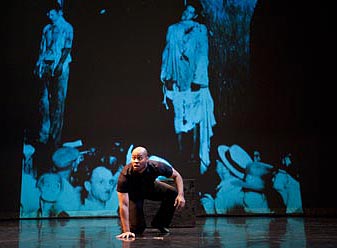One-man play confronts race issues with examination of lynching victim’s life
Patrick Sims’ brain is crowded with the lives and chatter of imaginary people. He’s been listening to them since they moved in some 12 years ago when he visited America’s Black Holocaust Museum on Milwaukee’s north side.

Patrick J. Sims, assistant professor of theatre and drama, rehearses for his one-person play, “Ten Perfect,” in Lathrop Hall on Jan. 15, 2010. During the play, Sims portrays 18 characters to tell the story of James Cameron, an African-American who survived a lynching as a teenager in Indiana in 1930. Sims’ public performance of the play is scheduled for Feb. 5-6, 2010, in Lathrop’s Margaret H’Doubler Performance Space.
Photo: Jeff Miller
Sims is an assistant professor of acting and director of the Department of Theatre and Drama‘s Theatre for Cultural and Social Awareness. He was in his first year at UW-Milwaukee in 1998 when he noticed a road sign giving directions to the now-closed museum. James Cameron opened the museum in 1988 to teach people about the historical struggles of African Americans — including his own terrifying story.
Video: Highlights from ‘Ten Perfect’
Cameron survived a lynching in 1930 in Marion, Ind., when he was 16. Accused of rape and murder, he was pulled from a jail cell by an angry mob led by the Ku Klux Klan and strung up on a tree limb, his two friends already dead, hanging by nooses. What happened next is a little fuzzy: Cameron said he heard an angelic voice telling the crowd to let him go, although no one else heard it. Cameron said the crowd grew quiet and he was released and taken back to jail. However it happened, Cameron was spared.
“I was floored when I walked into the [museum] room. Here I was, an Ivy League-educated, African American man, and I didn’t know Cameron’s story,” says Sims.
Sims met Cameron at the museum and that visit started a friendship between the two and, for Sims, planted a creative seed for writing and performance. Over the years, Sims has been writing and refining a one-man play based on Cameron’s life. The characters Sims created have been given life in his play “10 Perfect: A Lynching Survivor Story.” The play imagines Cameron’s life and the people in it up until the lynching. Sims will perform the play at 7:30 p.m. on Friday and Saturday, Feb. 5-6, in the Margaret H’Doubler Performance Space in Lathrop Hall, 1050 University Ave. Working with Sims is director Sheri Williams Pannell.
Through the play’s 18 characters, Sims tells a story and honors Cameron’s past, but doesn’t lose sight of the audience’s experience. There is minimal staging. Sims uses light, sound and his considerable performance skills to mesmerize. He transitions from one character to another, swinging back and forth in time and place with his voice and movements, for as much as he hears voices, he speaks in tongues.
In one moment he is the thoughtful older character voicing Cameron, with slow, measured cadence; then he is 6 years old, with a whining young insistence; then he has the sweet lilting voice of a protective mother; then a demanding swim coach; next a pastor, full of pulpit oratory, moral pronouncements and advice.
While the story is based on one man, Sims hopes the audience can learn and connect. “Cameron could have been me. My grandfather was almost lynched. I had a mother who kept me on the right path. There are 1,001 Cameron stories that we never hear,” says Sims. “This is as much your story as mine. We are all part of it.”
Sims believes that theater can help us confront difficult topics. “Race is so hard to talk about. There’s no way to talk openly without looking like an idiot. We don’t know how to talk about race relations, but it’s clear we all have opinions. The things we are afraid to say, the characters can,” says Sims.
In a performance where every next line is his, Sims has organized a post-performance panel to discuss issues raised in the play, including race and racism. Sims and Pannell will be joined by Cameron’s son Virgil; Sandra Adell, Afro-American studies; Martine Green, graduate student in theater research; and Fran Kaplan, a screenwriter from Milwaukee. The panel will be moderated by Linda Greene from the Law School.
“Theater is a way to have catharsis. But you must be willing to receive before you judge,” says Sims.
Tickets to “10 Perfect” are free and available at the Vilas Hall box office, 821 University Ave., 608-262-1500; the Campus Information Center in the Red Gym, 716 Langdon St., 608-263-2400; and the Welcome Center, 21 N. Park St., 608-263-2400, during regular box office and business hours. There is a limit of four tickets per person. Tickets are valid until 7:20 p.m. on the day of each performance. At 7:20, empty seats will be available to patrons without tickets.
Those attending the performances should be aware that the play is for mature audiences and contains adult themes and language. Support for the performances has been awarded through a competitive grant from the provost’s office and the Graduate School.
Tags: arts, College of Letters & Science, diversity, events, humanities, theater, video



